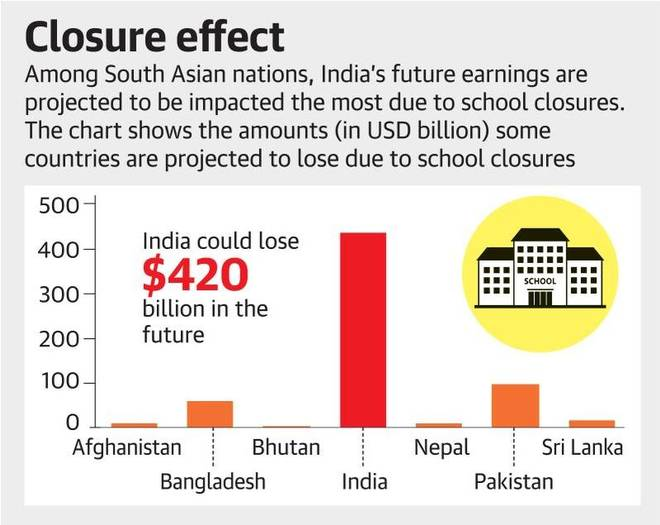Social Justice
South Asia Economic Focus Report: World Bank
- 12 Oct 2020
- 6 min read
Why in News
The World Bank has recently released its biennial South Asia Economic Focus report. The fall 2020 edition is titled “Beaten or Broken? Informality and Covid-19”.
- The report includes Afghanistan, Bangladesh, Bhutan, India, Maldives, Nepal, Pakistan and Sri Lanka.
- The report predicts that the extended closure of schools amid the Covid-19 pandemic could dent India’s future earnings by anywhere between 420 billion USD and 600 billion USD, as depleted learning levels of students will translate into poorer productivity going forward.
Key Points
- Impact on Education:
- Around 5.5 million students could drop out of schools across South Asia.
- 391 million students have been kept out of school in primary and secondary education due to lockdown.
- Dropouts, combined with substantial learning losses for those who remain enrolled in schools, would cost South Asia as much as 622 billion USD in future earnings and gross domestic product.
- The regional loss is largely driven by India, all countries will lose substantial shares of their GDP.
- The projected learning loss for the region is 0.5 years of learning-adjusted years of schooling (LAYS) at present.
- LAYS combines quantity and quality of schooling into a single easy-to-understand metric of progress.
- Due to the closure of schools, not only the learning process has been obstructed but the children may have forgotten their previous learnings.
- The average child in South Asia may lose 4,400 USD in lifetime earnings once having entered the labour market, equivalent to 5% of total earnings.
- Engaging children through remote learning programmes had been difficult, despite most governments’ best efforts to mitigate the impact of school closures.
- Impacts on Economy:
- Impact on Informal Sector: The report has flagged damage to businesses, consumption patterns and imposed social hardship on poor and vulnerable households, especially urban migrants and informal workers in the South Asia region. It has also warned against far-reaching consequences apart from these immediate impacts.
- GDP: The regional GDP of the South Asia region is estimated to contract by 7.7% in 2020.
- India’s Gross Domestic Product (GDP) can contract by 9.6% in 2020-21.
- Labour productivity: It will also take a greater hit from Covid-19 than most previous natural disasters. Reasons for the decrease in labour productivity are as follows:
- Globalization: The increased integration of the global economy will amplify the adverse impact of Covid-19. Effect on supply chains, export-import and international migration of labour will affect labour productivity.
- Capacity underutilization: Contagion prevention and physical distancing may render some activities, for example, the hospitality sector, unviable unless they are radically transformed, which will take time. Even in less directly affected sectors such as manufacturing, banking and business, severe capacity underutilisation lowers total factor productivity.
- Disruptions to training, schooling and other education: These may occur due to severe income losses as well as lack of access to training and education facilities. Even once restrictions are lifted, the impediment of training will also lower human capital and labour productivity over the long term.
- Other Related Reports:
- Recently, the UN Report on the Impact of Covid-19 on Children estimated that almost 24 million children could drop out or not have access to school next year due to the economic impact of Covid-19.
- Earlier this year, the Global Education Monitoring Report, 2020 was released by UNESCO which highlighted that the Covid-19 had worsened the inequalities in education systems worldwide.
Way Forward
- To avoid the outcome of the pandemic, progress on three fronts is required: Information, Solidarity and Action.
- It is critical that education is at the heart of international solidarity efforts, from debt management and stimulus packages to global humanitarian appeals and official development assistance.
- It is the time to step up international solidarity for children and humanity— and to lay the foundations for a deeper transformation of the way we nurture and invest in our world’s youngest generation.
- India as a lower-middle-income country needs to use education as an equalizer for its widespread socioeconomic inequalities. Focus on increasing the education budget in the New Education Policy and decreasing the digital divide are welcome steps to achieve this goal.





